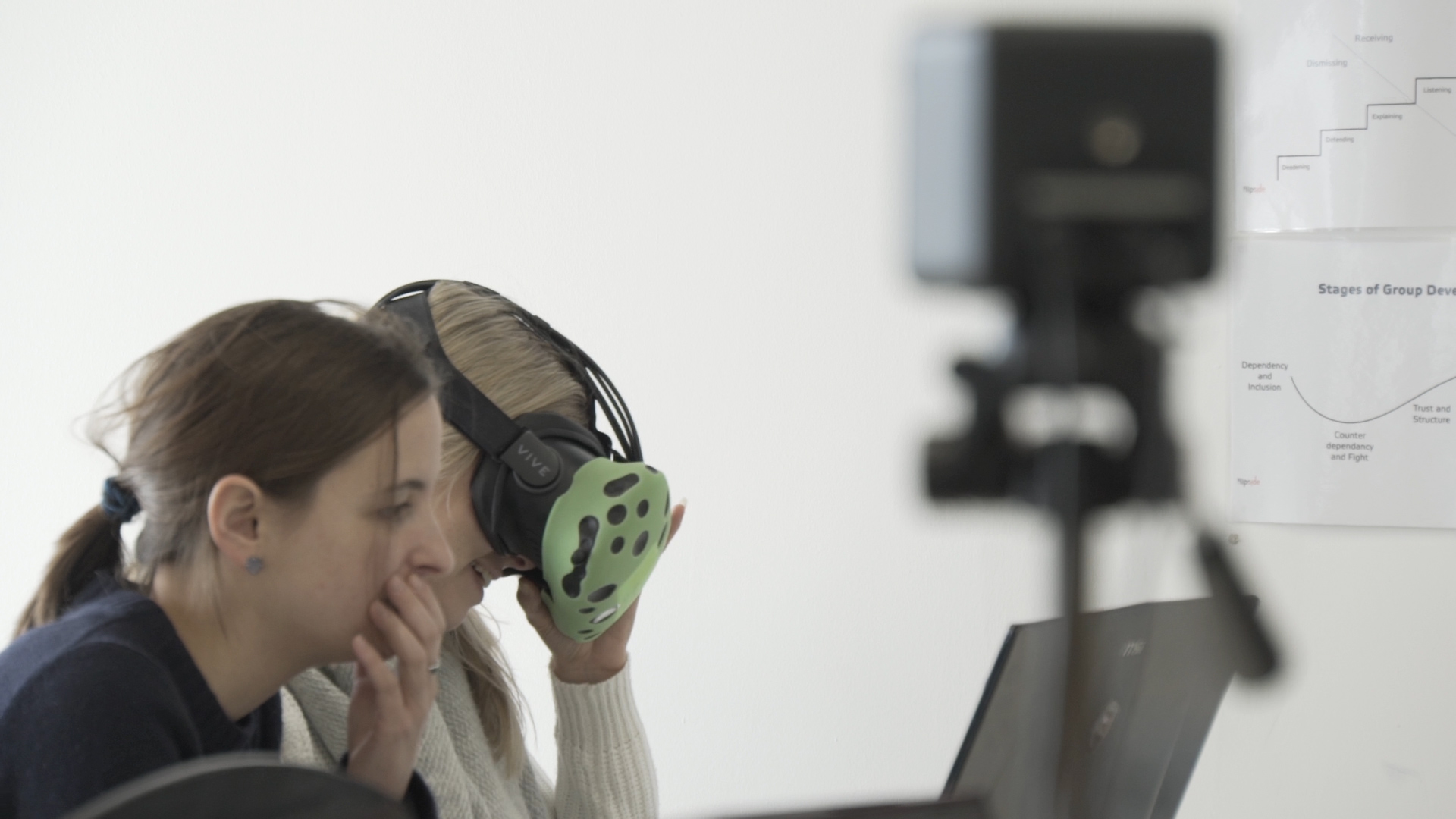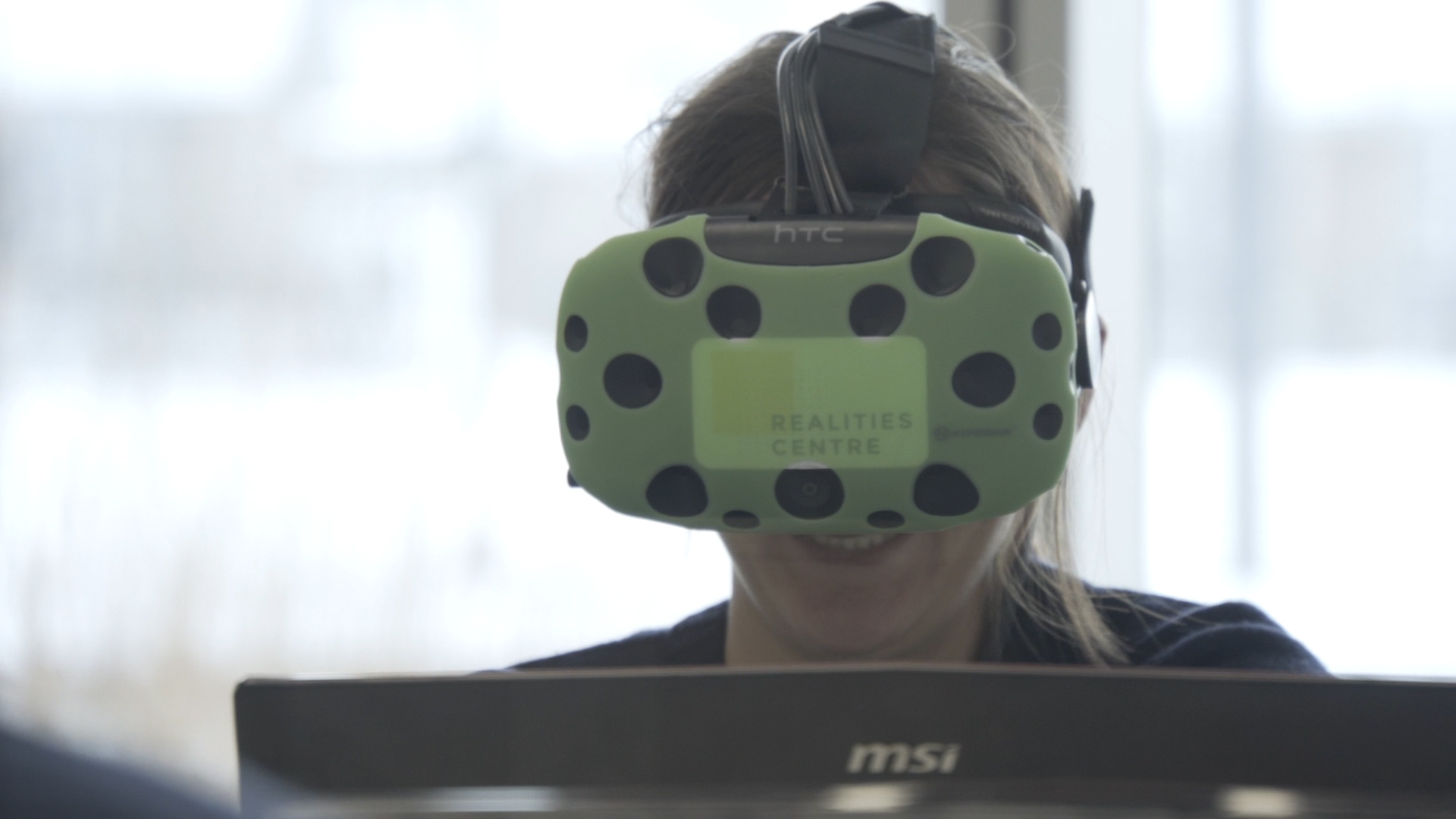WoW Woman in VR | Nina Salomons, Lead at VR Diversity Initiative and video content producer for VRFocus
Interview by Marija Butkovic @MarijaButkovic
Nina Salomons is Dutch, based in London. Nina has grown up in 9 different countries and is very interested in social matters such as politics, history, ethics and people. She also has a very keen love for space, nature and new discoveries.
Nina, what does your current job role entail?
I’m Video Content Producer for VRFocus. I interview people who work in the immersive tech space. The focus is on Virtual Reality, Augmented Reality and Mixed Reality, which fall under the term XR.
I also lead the VR Diversity Initiative, which is a not-for-profit programme under VRFocus. The VR Diversity Initiative is aimed at bringing under-represented groups into XR. This is done through lowering the barrier to entry to XR by giving participants an opportunity to attend a free workshop where they create an XR project with the necessary hardware, software and equipment. Success for us is getting interested individuals from under-represented groups hired by companies looking to diversify their company. Leading the VR Diversity Initiative means planning and preparing the workshops. This includes finding sponsors, workshop leaders, hardware, software and equipment required for the participants to create a rough XR prototype.
Has it been an easy industry to get into or have you had many challenges? How long did it take you to be where you are now? What was the biggest obstacle?
No, it has not been easy. It takes a lot of determination, time and networking. My journey began in 2015 soon after I graduated from film school, but let me first explain a bit about my background to give context. I got into VR through AR. Sounds strange, I know. However I believe that’s probably the route future VR enthusiasts will be taking.
I just finished graduating from MA in filmmaking in 2014 and first experienced AR at BVE (the UK’s Leading Entertainment & Media Tech event) in 2015. I’ve always been a massive fan of video games and previously had my own YouTube Gaming channel before Google bought the platform. On top of that science-fiction was my favourite genre for both films and video games.
It was a simple scan of a QR code, somebody handed me an iPad and a T-rex’s head stormed into the code at me. It was then another QR code where a building appeared and with an iPhone I could move closer and further away from it. This was probably my ‘aha’ moment, when I realised that the future I’d been seeing in films and video games was happening now.
There was no stopping me anymore. I knew I wanted to be part of this network and I started to do some researching whilst continuing my filmmaking career. Through 2016 I continued freelancing as a filmmaker, but simultaneously started to do a lot of research into the VR ecosystem. I reached out to various companies, creatives all working in the space but I had no coding experience, and so many people were confused by why I wanted to do it. There was no trust.
I had coffee with Anrick Bregman, a Unit9 Director and he gave me some advice on what I should do. 2016 was spent mostly on trying to afford the coffee’s, events, panels and money spent on travel to meet the right people. I ended up getting to know some people who did AR/VR at the pop up store at Old Street; I pitched ideas and came to the conclusion that I wanted to combine people outside of tech with people who know tech and bring the two together, at the time I had no idea that this would result in some form of a hackathon. 2016 also saw me getting more hands-on with planning, helping out with production and stitching 360 films for clients such as Renault, Tesco and Four Seasons.
This was when Anrick said he needed some help with press coverage for a VR experience called StormVR he was working on. I started to learn about press/media and publications that specialise in VR. I couldn’t find any massive influencers or websites that were willing to cover an indie experience at all. This is when I the got in touch with Thomas Gere who was doing the Realities Centre and I pitched the concept of a VR cosmetic surgery hackathon to him. Again, nobody trusted me but working for Anrick gave me some credibility and Thomas Gere then introduced me to Kevin Joyce, the CEO and editor of VRFocus.
I managed to get StormVR some coverage, got to know Kevin and set out to make the hackathon a success with his and Thomas’ assistance. The hackathon became a surgery hackathon, and a team won that have taken the idea and are now implementing into the NHS. The company is called Dualgoodhealth (http://dualgoodhealth.com/) and they do CPR training in VR.
It’s 2017 now and in the meantime I co-founded Unfold with Luciana Carvalho Se and Amandine Flachs in 2017, a meetup group which was initially aimed at women. Similar to Women in VR, it was a safe space for individuals in the VR space to connect and enthuse about the technology, their projects and just being in the industry. I started doing freelance video work for VRFocus before being offered a full-time position as Video Content Producer. VRFocus ran the first VR Diversity Initiative with Catherine Allen in the summer of 2017, and as it had the same aims as Unfold, I stepped down from Unfold when taking the full-time position at VRFocus.
It’s now 2018 and I’m now leading the VR Diversity Initiative.
What are your projects you are currently working on?
I’m currently working on creating video content for VRFocus and leading the VR Diversity Initiative. I also am trying to get a few of my own concepts off the ground that are all either VR stories, feature films and documentaries.
If there are any animators, companies that work in VR that would like to help me make a VR experience - please get in touch!
What are your biggest achievements to date?
‘My Gamegirl’ documentary tackled female stereotypes and was showcased at the Knickerbox film festival before the whole gamergate had taken place. I was pretty proud of that because I interviewed people across the whole world from different backgrounds to make it - and when I screened it I really felt like I was teaching people something new. About a world they had no concept of.
My ‘In State of Transit’ documentary is being used by the UNHCR to help save lives today, at the end of the day if your products are improving the world and making people’s lives better. You’re doing something right.
I’m actually pretty proud of my ability to organise the European Student Film Festival back in 2015. I had been a judge on the festival for a few years, but co-ordinating made me realise that I wanted to show the students that women had equal footing in the industry as men. I brought in some amazing women to teach and speak. I’m rather proud of that.
What does the #WomenInVR movement mean to you? What are the challenges of being a woman in VR industry?
#WomenInVR is amazing, mostly because I feel it’s come at a critical cultural and historical moment. For those of us who walked in the Women’s March, and having dealt with situations in Film, Gaming and Tech it feels like such a relief that at the very beginning of a new industry, people are trying to ensure that their sisters, mothers, cousins and just general other half of the population are human.
The biggest challenge I face in the VR industry I feel applies to both gaming and film. It’s pitching a project, going to a meeting and the other individual thinking there’s something in it for them. They might think it’s a date or be playing you along with the false hopes of funding your project with no real intentions to.
What will be the key trends in the VR industry in the next 5 years and where do you see it heading?
1) Eye-tracking - crucial and essential.
2) Out-of-home entertainment - VR Arcades, live broadcasting
3) You will see it trickling into all sectors and more people will become aware of it
4) Real ‘human’ moments and experiences in VR
5) AR’s popularity over VR by the majority of the population
What is the most important piece of advice you can give to all women in VR out there?
Use your womenly sensitivity and intuition. I think that gives us an edge.
Who are your 3 inspirational women in VR?
I’ve actually had to stop and think really hard about this. I believe it would be unfair to just choose three women. This is because there are so many different roles, sectors and skills required to do a job correctly. All the women that I’ve met are inspirational, and I think we all have to support every single one of them. From entry-level to senior, it’s all about supporting and helping one another.
Website: https://vrdi.uk/
Twitter: @VRDI_UK @ninaVRFocus
LinkedIn: VRFocus
LinkedIn: VR Diversity Initiative
LinkedIn: Nina Salomons
Facebook: VRFocus
This interview was conducted by Marija Butkovic, Digital Marketing and PR strategist, founder and CEO of Women of Wearables and co-founder of Kisha Smart Umbrella. She regularly writes and speaks on topics of wearable tech, fashion tech, IoT, entrepreneurship and diversity. Visit marijabutkovic.co.uk or follow Marija on Twitter @MarijaButkovic @Women_Wearables @GetKisha.




